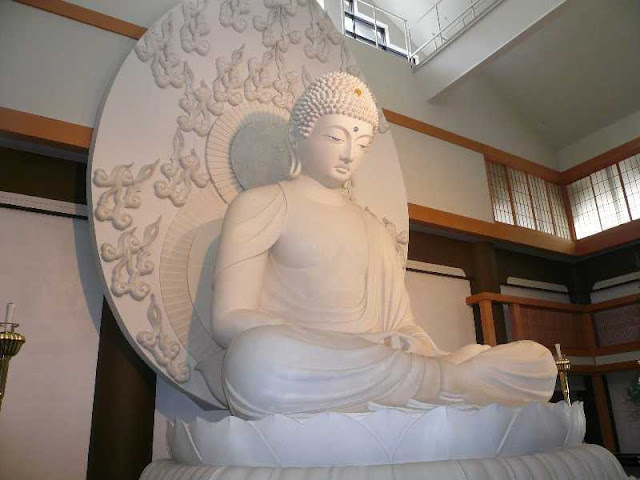Came across photos of Hercules protecting the Buddha. This is syncretism, the combining of traditions as the Silk Road connects early Buddhist culture with Greece. When you open up to the mythology of the whole world it's quite an exciting world.
The opposite of syncretism is fundamentalism. In fundamentalism you ward off combing ideas. Buddhism shouldn't combine with modern psychology. Buddhism shouldn't combine with secular ideas. We shouldn't care about the parallels with modern physics and Buddhism. Even Buddhism and Taoism or Confucianism shouldn't combine in early china. New age hippy ideas shouldn't be combined with Buddhism.
Closer to home, I think reliance on the guru in Vajrayana is Hinduism influence, perhaps. Buddha nature is Hinduism inspired, we are all god in some sects of Hinduism, OK we're all really Buddhas. Shake out what kind of interesting insights that might shake out. Pudgalavadins believe in a soul. Buddhism tries out other ideas in the history of Buddhism. Pure Land is an exploration of a kind of thinking, more reliance on other power.
We need self power, community power, and other power in the spiritual life because it is so demanding. There are some who believe the burning of oneself in protest isn't part of Buddhism. In a way the battle about what is and what isn't Buddhism is a constant battle. In Cambodia monks are brought up on heresy charges. In Europe there are blasphemy laws designed to protect Christianity being utilized for Buddhism.
I mean you can try to keep things pure and uninfluenced, and it's good to be clear what is what. To pretend like we're not influenced by everyone around us is silly. Materialism brought about by more fair economics is also a change in culture. The world is changing rapidly and yet humans need things to be the same, we are all profoundly psychologically conservative. Boredom is the emotion that drives us to challenge ourselves and try new things.
I can't help but think the spiritual life isn't where wars should be fought. The spiritual life can be focused on comfort, but it must also include an element of confrontation and discomfort. Not knowing and the negative capability can be used in the spiritual life.
People from traditional Theravadan countries sometimes see American adaptations of Buddhism as something they don't recognise, and can be offended by how it's being adapted. Some people want to have conflict over sects. There is a kind of branding war that smacks of materialism to me.
If there's no permanent self, can there be a permanent Buddhism? I think you can make mistakes, claim something is Buddhism and it's not, so I think there is a temporary essence, even if that is philosophically is problematic, it works psychologically. I keep coming back to the practices of community, devotion, study, ethics and meditation. Maybe it's my overly secularized influence, but I think Buddhism is more about what you do than what you claim to believe. Humans are complex and don't always act on their belief, we are hypocritical and unintegrated, confused, bewildered. Enacting ideals isn't easy. I also believe in authenticity over pretending you're more advanced than you really are.
Even if I am not a heritage Buddhist from a Buddhist country, and find secularizing interesting, doesn't mean that I can't be offended by McMindfulness and capitalism coopting the language of mindfulness to exploit workers better. I can even see traditionalist behavior as against Buddhist's quest for harmony. An over reliance on "right view" can seem like Christians hunting for blasphemy and dogma. Right view is the first step on the path, but like the first step in AA, is has to be constantly refreshed.
On page 80 of the Long Discourses the Buddha says to beware of eel wrigglers, people who can't be pinned down and won't express an honest commitment. Vagueness and superficiality are a problem.
My life experience matters, and the forced Christianity in America means I have little tolerance for what is Christian evangelical moves. Buddhism is supposed to change as it moves through new languages, new cultures, and new geography. But it still needs to be identifiable as Buddhism.
There is a point where Buddhism isn't just an individual sacred cherished aspect to a person and must enter out into the larger world. How involved in politics will it get? America is going through hype partisan times, as people don't understand that psychology pushes one to see the world in different ways, to see others hypocrisy, and not your own as much. It's the same old struggle in battling with yourself versus battling with the world. At the end of a soccer game, they play the song about how "everyone wants to rule the world."
Yes, maybe my white middle class male Buddhism is tinged with all those descriptors, but I still hope it reaches for something more universal, transcendent, and rooted. I like to think Buddhism isn't obsessed with gonads, flesh color and class, without deny those things are in play in the world, and not trying to silence anyone is expressing their experience about those things. I want to throw open my arms to everyone, metaphorically, but realize you can only see the people you see, in front of you, face to face. There are book Buddhists who just write on social media, but don't connect with sangha face to face. Everyone engages with Buddhism with their personality, history and culture.
Syncretism is unavoidable and therefore not unwelcome because resisting reality is a recipe for exhaustion, and errors. We both want to shoot for what we are not already and we must start where you are. It's about becoming, the glorious process of seeking.































